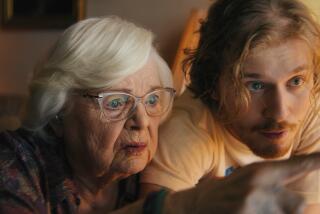Grandmother Steps In to Ease Loss of Mother
- Share via
SKOKIE, Ill. — Barrington Jones came to live with his grandmother that awful Sunday nearly nine years ago. He still recalls it vividly -- staring at his mother’s body, uncomprehendingly, as she lay in bed.
Barrington, then just 7 years old, thought that she was asleep. She’d been having one of her seizures. So her children did as she always asked. They left her alone to rest and wait it out.
This time, however, Hillary Jones -- a single mother of four -- never woke up.
“I didn’t really understand what happened until after a while,” Barrington said.
A tall, lanky 16-year-old, he is now the oldest of seven children that his grandmother, Thelma Davis, and her husband, Wilfred, have taken into their home in the suburbs just north of Chicago.
It is a common scenario: the 2000 Census found 2.4 million grandparents who are primary caregivers to grandchildren. Sometimes, the parents have died, walked away or struggled financially. Still others lose custody because of drugs or abuse.
Many psychologists and social workers who specialize in families say grandparents often provide stability and a bond that allows a child not only to survive but thrive. They can be a familiar, warm presence that softens the pain of a parent’s absence.
But it’s not always easy.
Resources -- money, time, energy -- are often stretched, particularly for grandparents on fixed incomes or whose health is declining. And frequently, experts say, the grandchildren have residual issues over their parents that even the most dedicated grandparents have trouble resolving.
Barrington knows how that is.
He loves his grandmother, and she loves him. She is, in many ways, his anchor. But sometimes he still feels adrift and alone, even in a crowded, two-level apartment.
Sometimes, he says, his grandmother’s love just can’t replace his mother’s.
“I just feel like something’s missing,” he said. “There’s a hole there, you know? I try to fill it with other things. But it’s hard.”
His sullen face brightens as he recalls a favorite memory of his mom -- getting to stay up when his younger siblings were asleep to play cards with her or watch TV together. She was only 30 when she died.
Barrington misses her, even when he tries not to.
He’d also like to see more of his father, who visits occasionally but has a new family that Barrington doesn’t really feel part of.
He’s even been wondering if he belongs with his grandmother and Wilfred, since they took in the other four children three years ago. Two are the children of Thelma’s son, Harold, who’s struggled with cocaine addiction. The youngest two are not Harold’s but have the same mother as his kids. She lost custody of all four amid accusations of neglect.
Their presence makes Barrington yearn even more for his own mother, even if she struggled on public assistance to raise him and his siblings with little help from the boyfriends who fathered them.
“Back then, I thought life was good. It wasn’t really that good,” Barrington said. “But honestly, I think it would be better because we wouldn’t have to go through all this mixing up.”
Certainly, money is just as tight for Thelma and Wilfred as it was for Barrington’s mom, despite the aid that the couple receives from the state of Illinois for rearing their grandchildren.
Thelma used to work 12-hour shifts as a certified nursing assistant but has cut back on her hours to care for the children.
Their grocery bills run about $250 a week. And earlier this year, the couple fell behind on payments and were evicted from the townhouse they were buying in nearby Evanston.
Still, Thelma says she had no choice but to take in all seven children -- six boys and a girl.
“I call them all my children. I want them with me,” said Thelma, who’s been surrounded by young ones much of her life.
The mother of eight of her own, she came to this country from Jamaica in 1967 to work as a nanny and maid with families in Miami Beach and then Chicago’s wealthy suburbs. She married Wilfred, a native of Belize, in 1981 and had her youngest child, Frances, with him the next year.
“Many babies have passed through these hands,” she said, holding them out and smiling broadly.
Now Wilfred supports the family by driving a forklift at a sporting goods company, while she runs the house -- going to parent-teacher conferences, doing heaps of laundry, making sure that homework is done and shirts are tucked in.
She’s enjoying her second chance at parenting.
“I don’t think my own children got as much out of me as these ones do,” said Thelma, 60. “I used to work so much. I’d be so tired. They’d want to tell me something and I’d say, ‘Mmm hmmm.’ But I’d be falling asleep.”
Still, keeping up with seven children is a challenge.
Time for individual attention is short. And Thelma readily concedes that she’s sometimes unsure how to comfort Hillary’s kids -- including the oldest, Chantel, who is putting herself through college and lives on her own.
“Now it’s really telling how hurt they were,” Thelma said.
Sometimes, she says, they burst into anger, seemingly for no reason. Other times, they are aloof.
Christoff, Barrington’s 13-year-old brother, occasionally goes straight to bed after school. Barrington likes to seek out the emptiest room in the family’s four-bedroom apartment in Skokie.
“I don’t really need that much attention. I don’t like that much attention,” he said. “When I do get attention, it’s to work.”
Even at his high school -- a sprawling campus with thousands of students -- Barrington says he mostly keeps to himself.
“Most dudes have a best friend or two best friends,” he said. “But I’m not really like that. Most of the time, I’d rather be by myself.”
In his room in the basement, Barrington keeps an old photo of his mom. Alongside it are pictures of a few girls from school, including some he has dated.
Girls, he says, are easiest to talk to: “I don’t know why. Maybe they fill some of that hole that’s there.”
His grandmother, a church-going woman who can be protective to a fault, grimaces at the idea of Barrington dating.
She’s been reluctant to let him get his driver’s license or go to school dances. She also frequently lectures him about AIDS, all the while watching his eyes for signs of drug use.
“I don’t see the badness yet, but I’m always scared,” said Thelma, who sometimes vents her concerns at a monthly meeting for grandparents rearing their children’s children.
Her worrying sometimes causes Barrington to keep his plans secret -- “even if it’s just going to the mall to get something to eat,” he said. But his gratefulness eases his frustration.
“Whenever I’m mad at her, I just don’t say anything,” he said. “She’s been there for me a lot.”
He’s less forgiving of Wilfred, his grandfather by marriage but not by blood.
“We don’t really speak,” Barrington said, complaining that Wilfred often rides him about playing sports. (He joined his school’s wrestling team this fall when Wilfred wanted him to play basketball.)
Wilfred -- who is the family enforcer when things get rowdy or chores go undone -- says he’s the one who initiates conversations with Barrington. But starting work at 6 a.m. also leaves him little energy for parenting when he gets home.
“I don’t go nowhere -- work, home, watch this,” Wilfred said, pointing to a fuzzy-screened black-and-white television on the kitchen table. “After the news, bedtime.”
Down the hall, Barrington is slouched on the living room couch, watching the family’s other TV. Christoff and their 10-year-old brother, Nicholas, occasionally join him.
If he belongs anywhere, Barrington says, it’s with the two of them.
“I mean, they get on my nerves. But I want to be there for them,” he said, pausing for a moment.
“But I don’t want them to be like me. Sometimes, I feel like I’m not going nowhere.”
In more upbeat moments, Barrington talks about becoming an electronics engineer or an author. A junior high teacher once told him that he had a talent for writing fiction.
His grandmother supports his college dream but says he’ll have to bring up his grades -- and likely pay his own way.
He’s determined anyway.
“I look at this situation and I think about how I want to have a better house, a better job, better income, better stuff for my kids,” he said.
“Just everything better.”
More to Read
Sign up for Essential California
The most important California stories and recommendations in your inbox every morning.
You may occasionally receive promotional content from the Los Angeles Times.













